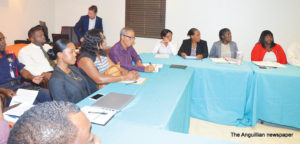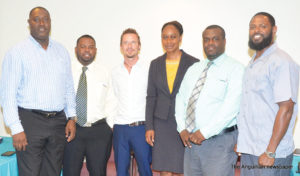The Energy Team attached to the Department of Environment hosted a three-day workshop, late last week, to sensitize members of the community and social stakeholders on the need to adopt a more conservative approach in the consumption of energy related to electricity. The opening ceremony had taken place on the morning of Wednesday, April 21st, under the theme: “Zero Investment & Revenue Generating Energy Management.”
The workshop was moderated by Mr. Calvin Andre Samuel, Energy Team member and the Director of Department of Environment. The facilitators were Mrs. Judith Ephraim-Schmidt, Program Coordinator and Mr. Martin Rufenach, Program Officer, both attached to the Energy Unit of the Organization of Eastern Caribbean States (OECS) Secretariat.
The training workshop sought to simplify the methods of energy conservation, and to get its participants to be conscious of their responsibilities of living every-day life in an energy saving mode.
The Hon. Curtis Richardson, Minister responsible for Utilities, reminded those in attendance that when they think about energy efficiency, what should come to mind are acts like switching to more efficient light bulbs. “However”, he said, “what is more important, and equally efficient, is the behavioral change in us as consumers of this precious resource called energy. Such a change requires certain actions including: switching off the lights when exiting rooms, wearing lighter jackets to avoid overheating (and by extension the cost of cooling), and turning off computer monitors when leaving offices — among other things.”
The Minister made mention of the fact that Anguilla is now afforded the opportunity for this “Zero Investment” training coordinated by the energy efficiency team and its colleagues from CBCL Consulting, the Caribbean Development Bank and now the OECS. He said, “This is an investment in us which will yield results that are promised in the description of energy efficiency.”
Finally, in expressing his own prospects for the energy saving program, the Minister stated: “The team’s approach is to use as little money, if any, from Government’s coffers through reduced consumption, reduced expenditures, and streamlined operations. These are beneficial to the taxpayers and would provide sustainable employment for the Government of Anguilla. I believe that the team’s work can realize the dream of energy efficiency and conservation for the Government and the good people of Anguilla.”
Addressing the opening ceremony, Program Coordinator, Mrs. Judith Ephraim-Schmidt, said: “We wish to thank the Government of Anguilla for its invitation to conduct this training. We want to express our thanks for your warm hospitality. I must share with you that when the Government of Anguilla heard of this opportunity, they moved very quickly to learn even more, and to set into motion a strategic plan that would bring together other energy efficiency related initiatives that would produce an end result of greatest impact to you the nationals.
“There was little need to convince your Government officials of the importance of this training. We commend the Government for its foresight, and its commitment, because even though the hurricane season of 2017 had delayed our efforts, we see that now this workshop is becoming a reality.
“We see this training not only contributing to sustainable development as a whole, but it also adds to our efforts in building resilience, something you were able to identify with over the past few months.
“Energy continues to be a critical factor in our development. With the importance of fossil fuels, we recognize our vulnerability to the fluctuation of global energy prices. We know that energy is needed for all aspects of life and our development. Yet, the high price of energy is a major contributor to the high food and commodity prices that directly impact our standard of living in the region.
“On the positive side, though, because energy affects all sectors, interventions can be implemented in almost every area which will result in a multi-faceted approach to addressing our energy challenges. As a region, we are taking some significant steps to reduce our energy cost, increase our energy security and develop our indigenous sources of energy.
“This workshop, however, will focus on an aspect of sustainable energy which holds tremendous untapped potential for our region. For most of us in the Caribbean, 95% of our electricity is expended in buildings. Therefore buildings represent a good opportunity for us to become more energy efficient. Buildings are really at the heart of our settlement. They are an indication of our values and our culture as a society.
“Your traditional architecture here has encouraged energy efficiency. When I look around, I see the quality of your buildings in which you have proper natural ventilation and natural lighting. But as you continue to advance and improve with your architecture, you will need to make sure that the quality of your architecture is both climate-smart and energy-smart. And so, we see energy efficiency not only as a cost efficient solution but something that is easy to undertake and something that makes good sense.
“The positive spinoffs arising from taking such measures allow financial savings that can be used in other developmental areas at both the national level, and even at the personal level where there would be high savings.
“While we recognize the importance of financing for energy efficiency, the initial investments that need to be deployed normally are not expensive and they pay off very quickly. Therefore, this should be a good sell. The workshop is really designed to help you develop a “zero investment” energy management program which is simple, but effective, and it will allow you to realize savings that can be later ploughed into energy efficiency retrofits, where you can gain even more savings.”
In bringing awareness to the possibility of effecting energy savings, Minister Curtis Richardson quoted the Japanese physicist Shuji Nakamura who once said: ‘The LED light bulb has more than ten times the efficiency of the regular incandescent lighting, so it can save the world hundreds of billions of dollars in electricity costs.’










